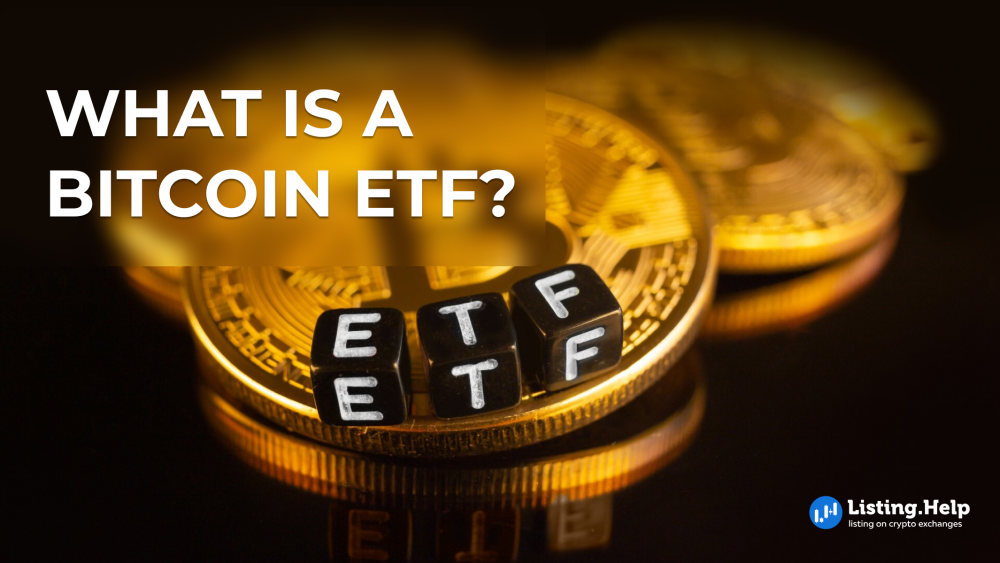What Is a Bitcoin ETF? Types of Bitcoin ETF
 February 14, 2024
February 14, 2024 Updated: January 27 2025, 07:19
Updated: January 27 2025, 07:19
LEAVE A REQUEST
Launching your own token project? Our experts are ready to help with listing on exchanges, market making, marketing and other solutions
SUBMIT APPLICATIONAs enthusiasm for cryptocurrency surges, so does the pursuit of investment avenues that connect individuals to blockchain-based businesses and financial pools. Among these, the Bitcoin ETF emerges as a standout, attracting notable focus for its role in blending the cryptocurrency sector with established financial practices.
What Is an ETF?
An ETF, short for exchange-traded fund, functions similarly to a stock on the stock market but represents a basket of assets or an index instead of a single corporation.
This type of investment tool offers individuals the opportunity to invest in a variety of assets, like precious metals or energy resources, without the need for physical possession. ETFs are available on conventional stock exchanges, and their market value often reflects the price movements of the assets they represent.
For instance, the S&P 500 ETF provides a way for investors to engage with a broad spectrum of the top-performing U.S. companies through one transaction. This approach streamlines the investment process, making it easier to diversify holdings and manage investment risk.
What is a Bitcoin ETF?
A Bitcoin ETF represents a specialized form of exchange-traded funds that facilitates easy and regulated trading of Bitcoin’s market price within the traditional investment sphere. This financial instrument allows both individuals and larger entities to invest in Bitcoin indirectly, bypassing the technical challenges and security concerns of direct cryptocurrency ownership.
The main goal of this ETF is to demystify the process for those intrigued by the prospects of Bitcoin but daunted by the complexities or hands-on management of digital currencies.
Its significance lies in its ability to link the conventional investment world with the burgeoning sector of digital currencies. Offering a regulated, simplified route for such investments broadens its appeal to a wider audience, from casual investors to more substantial institutional participants.
The advent of such an ETF promises to integrate cryptocurrencies into the mainstream investment narrative, creating an environment that welcomes a variety of investment strategies and risk profiles.
The evolution of Bitcoin ETFs has unfolded at a measured pace, shaped by regulatory obstacles and shifts within the financial landscape. Different iterations of these funds have been launched across several jurisdictions, such as the United States, Canada, and Europe, each designed to align with local regulatory norms and the preferences of investors in those areas.
This range of offerings underscores an increasing acceptance of digital currencies as a vital component of the asset spectrum, attracting interest from both longstanding financial institutions and nascent online trading environments.
Types of Bitcoin ETFs
There are various categories of Bitcoin ETFs, each offering distinct investment methodologies in the realm of Bitcoin. The primary types include spot ETFs, also known as physically backed ETFs, and those based on futures contracts.
Spot ETFs directly possess Bitcoin, ensuring that each share is backed by a real amount of the cryptocurrency safeguarded by a custodian. Investors in these ETFs indirectly hold a stake in the actual Bitcoin, with a significant emphasis on the custodian’s security measures to protect these assets.
Futures ETFs invest in futures contracts that reflect the price movements of Bitcoin, allowing investors to speculate on its value without holding the cryptocurrency itself. These ETFs facilitate trading on standard exchanges, offering liquidity and flexibility for speculative strategies. However, they may not track the cryptocurrency’s price as accurately as spot ETFs, with discrepancies potentially arising from market trends and the inherent risks of the futures market.
Mining ETFs provide exposure to the returns from Bitcoin mining operations, eliminating the need to directly invest in the stocks of mining firms. The performance of these ETFs is linked to the success of the selected mining entities, offering a way to profit from the sector’s expansion and support further investment and recognition of mining’s role.
Short ETFs are designed to profit from a decrease in Bitcoin’s price, using financial derivatives to emulate the process of short selling. These ETFs offer returns when the price of Bitcoin falls, appealing to those betting against the market.
Long ETFs aim for gains from an increase in Bitcoin’s value, the opposite strategy of short ETFs. These ETFs use financial tools to benefit from the cryptocurrency’s price rise, making them suitable for investors with a bullish outlook. While all spot ETFs inherently operate on a long basis, specific long ETFs may also delve into derivatives or futures to maximize potential returns.
Advantages and Disadvantages Bitcoin ETF
Bitcoin ETFs, like all investment vehicles, come with their own distinct benefits and drawbacks. Each type of ETF offers unique pros and cons, but here we’ll focus on the general aspects.
Advantages:
– Opens the door for both companies and individuals to gain exposure to bitcoin without having to buy the cryptocurrency directly.
– Bypasses the technical and security challenges associated with personal bitcoin custody.
– Increases market liquidity and lowers the cost of transactions.
– Offers a regulated and transparent way to invest in bitcoin, appealing to a broad spectrum of investors.
Disadvantages:
– Regulatory bodies have raised concerns about potential market manipulation and the safeguarding of investors.
– ETFs based on futures contracts have been criticized for potentially facilitating market manipulation.
– Dependence on the ETF provider’s management and security protocols introduces a level of counterparty risk, something bitcoin was initially designed to mitigate through direct ownership.
Deciding to Invest in a Bitcoin ETF
Whether or not to put money into a Bitcoin ETF is a decision that hinges on several personal factors, including your comfort with risk, your investment targets, and how well you understand the cryptocurrency sphere. Some investors lean towards purchasing BTC directly to fully harness the benefits of its decentralized nature, though this approach demands technical savvy. Alternatively, many opt for the indirect route offered by ETFs.
Bitcoin ETFs present a streamlined and officially regulated avenue to engage with Bitcoin, yet they’re not without their challenges, such as management expenses and the influence of market fluctuations on their performance. It’s crucial, irrespective of the route you choose, to weigh the advantages against the disadvantages and evaluate how either option fits within your broader financial plan.
Conclusion
Moving forward, the development of Bitcoin ETFs, along with the wider scope of cryptocurrency investments, is poised for ongoing growth. This progress will be driven by enhancements in legal regulations, breakthroughs in technology, and changes in what investors are looking for.
With an increasing appetite for digital assets and a market in search of reliable and straightforward investment methods, Bitcoin ETFs are anticipated to play a more significant role. They are set to offer more adaptability, clarity, and ease of access to the cryptocurrency sphere for investors.

For more insights and updates on blockchain and cryptocurrency, visit our blog at https://listing.help/blog/.







 February 19, 2026
February 19, 2026 








